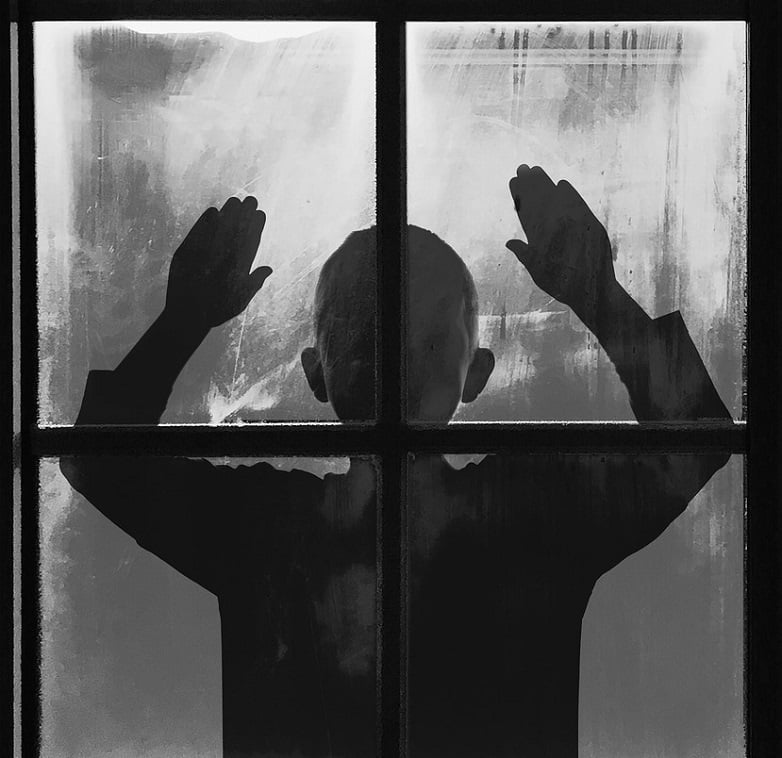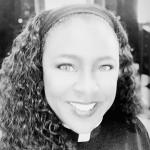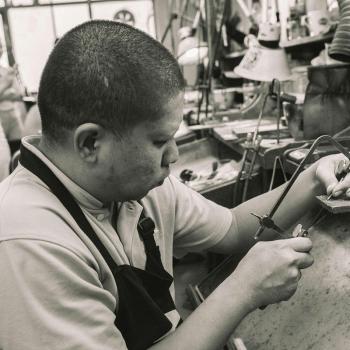What is the opposite of love? Guest writer Jack Thomas shares a perspective based on his own childhood trauma and military-related PTSD.

I’d like to introduce you to my good friend, Jack Thomas. I met Jack when we were both pastors in the same Baptist association in Virginia. As you read his article, I hope you’ll hear his comforting Southern drawl, coming through his written words. I also hope you’ll receive the wisdom he has gained from years of military service to his country as well as service to God in the pulpit. Jack and I have supported one another through good times and bad. I am glad to have the opportunity to feature him on this platform.
“What is the Opposite of Love?”
By Guest Writer, Jack Thomas
Good Vs. Evil
Because of my son, I have come to enjoy superhero movies. The good vs. evil with good triumphing over evil is a story we all love and want to see, especially if the good is a small boy with a slingshot and the evil is a well-armed giant of a warrior. One of my favorite superhero movies may not be considered by some as that type of a movie just from the title. Still, the entire script is about a young boy who leaned on comic books as a child as a coping mechanism for his traumas and sees his adult self as a villain looking for his counterpart, the indestructible superhero.
Shattered by Fear
The movie is “Unbreakable,” with Bruce Willis and Samuel L. Jackson. If you haven’t seen the movie, Jackson’s character from his childhood had a rare bone disease that would cause his bones to shatter very easily. Others teased him with the name Mr. Glass because he would so easily shatter like glass. During countless times in the hospital recovering from surgeries, he would pass the time reading comic books. As he gets older, he begins to look for his counterpart, the hero who can only be defeated by one simple weakness, like Superman’s weakness to Kryptonite.
Enter Bruce Willis’ character. He has never had a broken bone or severe injury. If you haven’t watched the movie, here is a spoiler alert warning: Willis’ character does have one weakness that Jackson’s character finds out about and looks to exploit. This weakness is based on one thing, his fear of drowning. It comes from when he nearly drowned as a child. He is afraid of water. Water is not his weakness. Instead, his fear of water is. So, Jackson’s character exploits his fear of water to attempt to defeat his arch-rival.
What is the Opposite of Love?
Fear. That is the opposite of love. Many may disagree with me and say, “No, hate is the opposite of love.” After all, don’t we see shirts and hear people always say, “Love, don’t Hate.” I propose a different concept based on 1 John 4:18a: “There is no fear in love, but perfect love casts out all fear.” This verse says nothing about hate. I believe the main reason is that hate is always based on fear. Yet fear doesn’t always create hate. So, fear is the emotion that we need to address.
There is an old saying that Scripture mentions 365 times in various ways, “Don’t be afraid” or “Fear not.” Noted theologian and author Keith Giles debunks this statement in his article, “No, The Bible Does Not Say ‘Fear Not’ 365 Times.” Like Giles, I agree the intent behind this statement may be a good one, no matter how incorrect it is. The point that this quirky little statement is trying to convey is that for every day of the year, scripture encourages us not to be afraid. Even if scripture did say this exact phrase 365 times, sometimes that is easier said than to accept it as reality, especially in people whose brains have been affected by significant trauma, like Jackson’s character in the movie.
How Does Trauma Play a Part?
I am one of the 10.1% of combat veterans from the Desert Shield/Desert Storm war of 1991 diagnosed with PTSD as a service-connected disability. More than 650,000 served in Desert Storm. So, approximately 65,650 veterans from that war have PTSD. The number of veterans with PTSD from the most recent 20 years of war with Afghanistan and Iraq is about 13.8%. This number does not include another 1.9% of non-deployed veterans during this period diagnosed with PTSD, or approximately 455,400 deployed vets and 62,700 non-deployed vets. These numbers are based on those that are verified through the Veterans Administration.
A couple of things to note, first, this does not include those who have not sought treatment or been reported as having a confirmed diagnosis. My PTSD went undiagnosed and untreated for 20 years. It also doesn’t include the spouses, children, and other family members who are traumatized by the actions of the injured veteran. So, I am sure these numbers are much higher. These unreported numbers may explain why Veterans are overrepresented in the homeless population. They also explain why so many non-deployed veterans have PTSD. Sexual abuse and domestic violence are common among women serving in the military.
Living with PTSD
I am also a survivor of childhood sexual abuse. When discussing PTSD, it is essential to remember that it can occur in all people of any ethnicity, nationality, or culture and at any age. Not everyone can be questioned about PTSD. Therefore, it is estimated that approximately 3.5% of US adults every year and 1 in 11 people will be diagnosed with PTSD in their lifetime. Women are twice as likely, 8 in every 100, to have PTSD as men, 4 in every 100, due to the sexual assaults, emotional, physical, and mental abuse from domestic violence that women face as opposed to men. Children also suffer from mental, emotional, physical, sexual, and verbal abuse at an alarmingly high rate.
PTS and PTSD
Another thing to consider regarding PTSD is that it can occur after anyone has been through a traumatic event. “Trauma” is used to describe many different types of experiences that are stressful. But not all stressful events are the type of trauma that can lead to PTSD. Post-traumatic stress signifies a stressor that prompts fear leading to a fight, flight, or freeze response. Post-traumatic stress may cause you to have anxiety about something without causing the anxiety to limit or impinge on your daily life, creating a disorder.
The word “disorder” describes a trauma that was such a shocking and dangerous event that you see or happened to you. It further defines the trauma as so intense that it creates significant disturbances or disabilities in your everyday life. During this event, one will think that their or others’ lives are in danger. Many of us will experience at least one trauma in our lifetime that could lead to PTSD. At the same time, the majority will experience something that leads to post-traumatic stress without disrupting our lives to present a disorder. Some factors put you at risk of experiencing trauma, many of which are not under your control. For example, if you were directly exposed to the trauma or injured, you are more likely to develop PTSD rather than PTS.
A Tree of Hate
So how does this relate to fear being the opposite of love? Humans have a fight, flight, or freeze mechanism built into our bodies for protection. When this system is overburdened due to fear by a stressful event leading to PTS, or a trauma event that leads to PTSD, the flight or freeze response to the fear is not always based on hate. While a seed of fear will always drive the fight part, it is that seed of fear that cultivates and grows our dislike, distrust, and disdain of individuals or groups of individuals into hate. This hate is generally based on what we are told or believe about others’ actions, beliefs, culture, or ideologies. When we give the seed of fear room to grow this way, it almost always grows a tree of hate.
Choosing Trees
This tree will always bring the fruit of violence and destruction by physical, mental, emotional, or verbal means. This tree is usually based on our “knowledge” or what we “think we know.” 1 Corinthians 8:1b-3 states,
“We know that we all possess knowledge. But Knowledge puffs up while love builds up. Those who think they know something do not yet know as they ought to know. But whoever loves God is known by God.”
This is why the choice between the Tree of Knowledge of Good and Evil and the Tree of Life is something we need to understand and still choose towards life, not knowledge.
Tree of Knowledge vs. Tree of Life
In contrast to the Tree of Knowledge of Good and Evil, grown by a seed of fear, where we “think we know,” the Tree of Life will always be born from a seed of love. The verse I just quoted compares with the passage in 1 John 4, which began this article. This chapter teaches us that as children of God who eat from the Tree of Life, we are born from a seed of love, not the Tree of Knowledge born from a seed of fear.
Test the Spirits
As children of God, the world can be a scary place. In 1 John chapter 4, the Apostle addresses us as children. He tells us not to believe everything we think we know. Instead, we must test everything through the Spirit of God’s Love. He even tells us that not every Spirit is the Spirit of Jesus. If we choose to listen to our limited human knowledge and don’t follow God’s Holy Spirit of Love through Jesus, we don’t know God, for God is Love. He closes by saying that when we have tested the spirits and then know and believe the Spirit is from God, our love is made perfect and perfect love casts out all fear because there is no fear in God’s perfect love.
The Questions Then Begin to Come
How do we see those who act, believe, think, and live differently than us with all of the threats of fear around us that come in through social media, mainline media, our religious upbringings, and our tribal instincts? Do we, like Samuel L. Jackson’s character did, go out looking for those that are our opposites and turn them into villains while we see ourselves as the good guys? Are we walking in the Spirit of God’s Love if we do? Or are we not giving in to the seed of fear? Do we see others as our brothers and sisters, all as part of God’s children, regardless of their culture, ethnicity, political or religious beliefs? If we don’t, do we begin to see them as threats and their ways as things to avoid or destroy? Is that genuinely eating from the Tree of Life from the seed of love that builds up?
Or is it feeding from the Tree of Knowledge of Good and Evil, thus seeing from our limited knowledge about what we see and think we know to destroy others? Or do we just live in the PTSD or PTS of our lives and live in that fear, like many people paralyzed by their trauma and stuck in the fear? Do we become spiritually homeless and lost outside of the love of God? Do I, and those like me, live in that constant paranoid brain of the fight, flight, or freeze brain because we don’t work to overcome our PTSD? Or do we do the hard work of changing our thinking not to live or cultivate the seed of fear? Because of PTSD, there are trust issues, sometimes even in the simplest of things. Unfortunately, the most significant battle comes with lacking trust in relationships with others.
Metanoia Vs. Paranoia
So, How Do We Move Forward in Love and Not Fear? The Greek word for repent, or change the thinking, is metanoia. Unlike paranoia, which means two minds, to live in that parasympathetic part of the brain where fear of survival cycles between our reptilian instinct to strike out and our mammalian instincts to protect or rather over-protect life, metanoia is defined as going beyond the paranoid brain into our cognitive brain of reason and understanding, our rational mind as one may say. It follows the prophet Isaiah’s instructions: “Come let us reason together.”
Let us put our hearts and minds together to rationally and lovingly do away with the fearful things that divide, separate, and destroy. Let us find the love of God that causes us to see each other as fellow humans made in the image of God. Then and only then will we be able to “love our neighbors as ourselves.” In Jesus’ command to the rich young ruler, we see that we can’t love God unless we love our neighbors. Likewise, we aren’t loving God if we aren’t loving our neighbors in spite of our differences.
Love Has to Be the Answer
So, in a world where we are taught through a tribal mindset to fear this or that political agenda, ideology, culture or ethnicity, lifestyle, or group, love has to be the answer. The Holy Spirit of Love requires us to put away what we “think we may know,” as the Apostle Paul wrote, we searchingly strive to understand the height, depth, width, and length of God’s unsearchable and unconditional love and grace to all. Only in that will we find the Tree of Live in God’s perfect love.
Love is defined in 1 Corinthians, where our actions and words without love will be like a clanging cymbal or noisy gong. As described in 1 John 4, perfect love casts out fear because it is patient and kind, doesn’t envy or boast and is not arrogant or rude. Perfect love casts out fear because it doesn’t insist on its own way; it’s not irritable or resentful and doesn’t rejoice at wrongdoing but at the truth. Love, perfect love, bears all things, believes all things, hopes all things, and endures all things. May we all rest in love and not fear each other.
Disclaimer:
Disclaimer: I am not a mental health professional or provider. My comments on PTSD and PTS in this article I based solely on my experience and personal healing through more than ten years of trauma therapy and counseling. If you or someone you love are struggling with mental health issues or symptoms of PTS or PTSD, please seek professional help from a licensed trauma therapist. If you’re struggling with suicidal thoughts or feelings, please reach out to the Vet Crisis line if you are a Veteran or the National suicide hotline:
- USA: Dial 988
- Canada: Dial 1-833-456-4566
- UK: Dial 0800 689 5652
- Australia: Dial 13 11 14
- New Zealand: Dial 0800 543 354
- South Africa: Dial 0861 435 787













